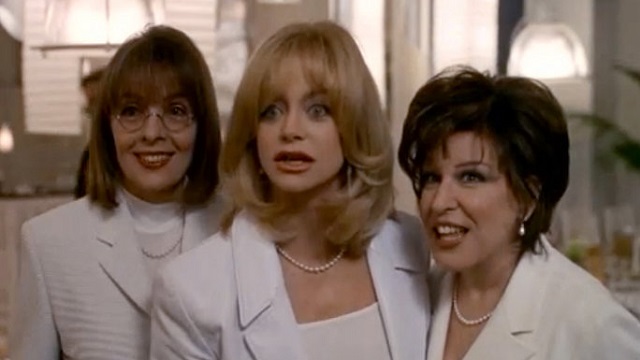Twice on this website, I’ve written about the adaptations of The Lives and Loves of a She-Devil. First, I wrote, briefly, about the miniseries The Life and Loves of a She-Devil. Later, I wrote about Susan Seidelman’s 1989 adaptation She-Devil, starring Roseanne Barr. I love both of these dark comedies precisely because they know what they are. The former is a pitch black comedy about the ways that a woman must contort herself in order to survive in the world. The latter is a dark comedy about female empowerment in the face of divorce.
The First Wives Club takes the plot of divorced women seeking justice and spins it to 1990’s farce. Directed by Police Academy‘s Hugh Wilson, and starring three of cinema’s broadest broads (Goldie Hawn, Diane Keaton, and Bette Midler), The First Wives Club dishes out the pleasures of sisters doing it for themselves in the slap-happiest way possible. Hawn is an aging actress who gets face lifts and lip injections in zany attempts to gain roles while her soon-to-be-ex-husband director tries to take all her money in the divorce. Midler is an aging frumpy housewife whose husband is going through a midlife crisis and exchanges her for a newer model (Sarah Jessica Parker as a wannabe rich girl with all the crassness of new money). Diane Keaton is a doormat for her husband who leaves her for every woman possible.
Each of the women seek justice for husbands who have wronged them, but they tell themselves that this isn’t in the cruel ways of Roseanne Barr’s She-Devil. Hugh Wilson obviously agrees with them. Instead of jokes about bed wetting or honey traps, Wilson has his actresses snooping around with Bronson Pinchot while they get trapped on a falling window washer platform. The attitudes of the women flip within a scene, and there’s even the female-movie requisite “we’re breaking up this friendship so we can have a reunion” sequence.
Maybe it’s my head cold, but there’s something kind of delightful of having a comedy this light and fluffy about women seeking revenge. It certainly isn’t as dark and cruel as The War of the Roses nor does it aspire to be. Hawn, Midler and Keaton seem to be here just to have a good time, and Wilson emphasizes the slapstick and the repartee over the plot or any attempts at realism. It’s here to delight even in its attempt at slightly dark humor.


